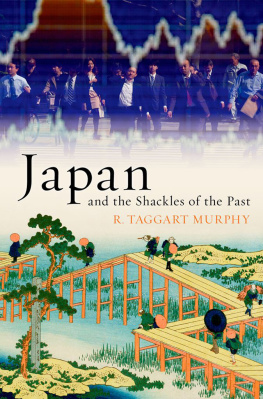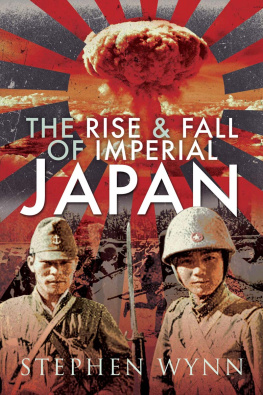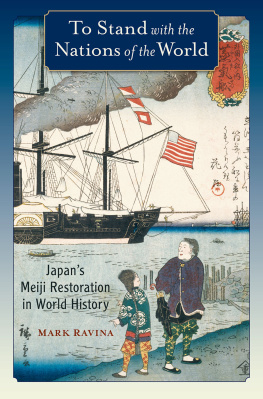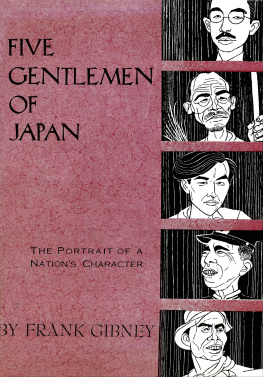Japan and the Shackles of the Past

Oxford University Press is a department of the University of Oxford. It furthers the Universitys objective of excellence in research, scholarship, and education by publishing worldwide.
Oxford New York
Auckland Cape Town Dar es Salaam Hong Kong Karachi
Kuala Lumpur Madrid Melbourne Mexico City Nairobi
New Delhi Shanghai Taipei Toronto
With offices in
Argentina Austria Brazil Chile Czech Republic France Greece
Guatemala Hungary Italy Japan Poland Portugal Singapore
South Korea Switzerland Thailand Turkey Ukraine Vietnam
Oxford is a registered trademark of Oxford University Press in the UK and certain other countries.
Published in the United States of America by
Oxford University Press
198 Madison Avenue, New York, NY 10016
Oxford University Press 2014
All rights reserved. No part of this publication may be reproduced, stored in a retrieval system, or transmitted, in any form or by any means, without the prior permission in writing of Oxford University Press, or as expressly permitted by law, by license, or under terms agreed with the appropriate reproduction rights organization. Inquiries concerning reproduction outside the scope of the above should be sent to the Rights Department, Oxford University Press, at the address above.
You must not circulate this work in any other form and you must impose this same condition on any acquirer.
Library of Congress Cataloging-in-Publication Data
Murphy, R. Taggart.
Japan and the shackles of the past/R. Taggart Murphy.
pages cm
Summary: A penetrating overview of Japan, from a historical, social, political,
economic, and cultural perspectiveProvided by publisher.
Includes bibliographical references and index.
ISBN 9780199845989 (hardback : alkaline paper)
eISBN 9780190213251
1. JapanHistory. 2. JapanEconomic conditions. 3. JapanSocial conditions. 4. JapanPolitics and government. 5. Social changeJapanHistory. I. Title.
DS836.M885 2015
952dc23
2014013756
For Osamu
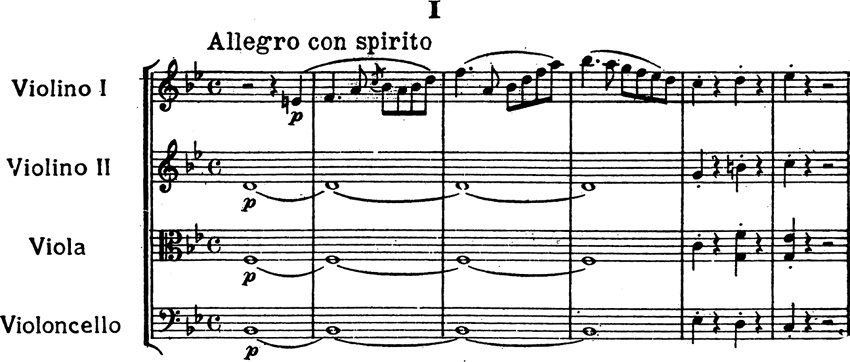
Contents
This book started out as an entry in the Oxford University Press series What Everyone Needs to Know. Japan merits the kind of treatment other subjects in this series have received, and I was flattered when David McBride asked me to provide it. But I was also uneasy. I feared that no one who knew anything about Japan would pick up a book with such a title, and everyone else would ignore it. For it seemed back in 2010 that the only thing about Japan that still interested the outside world was its culture: the cuisine, the traditional arts, contemporary fashion and design, Murakamis fiction, and all those bizarre videos and comics. If the countrys politics, business, and economics still commanded any attention from anyone other than the Japanese themselves and a handful of oddballs like me whose lives had somehow become intertwined with the place, it was purely as lessons in what not to do. While I thought that notion mistakenJapan offers lessons of all kinds and those lessons extend well beyond the what not to do typeall my previous published writing concerned itself precisely with those issues no one seemed to care about any longer (i.e., Japanese politics, business, and economics). One more book wasnt going to change this state of affairs, rekindling the kind of widespread fascination that the country once commanded.
But Davids proposal offered me an opportunity to do what Id never be able to get away with in any other kind of writing: integrate my thinking on Japans politics and economics with precisely the historical and cultural issues that seem to continue to interest people. The more I have pondered such things as the way credit creation in Japan translates into economic activity or the central (if little understood) role Japan played in the construction of the current global financial frameworkissues that dominate my other booksthe more I have become convinced that it is not possible to understand these matters in isolation; that grasping any aspect of Japanese reality requires grappling with the totality of the Japanese experience. To put this in other words, the Bank of Japans monetary aggregates, personnel practices in Japanese corporations, Tokyos wacky street fashions, the endless musical chairs of Japanese politics, and Japans centuries of seclusion are connected in all kinds of ways. David was offering me the opportunity to tease out some of these connections. If few ended up reading the result, well, writing the book would nonetheless allow me to put some order into a lifetime worth of reflections, to clarify my thinking on subjects that have obsessed me since I was 15 years old, got off the plane at a shabby, crowded Haneda airport, and took a long bus ride through a gray, throbbing, teeming urban landscape that didnt look like anything I had ever seen before. I decided the book was worth doing.
I had barely started work when events proved that I might have been wrong in assuming no one cared much about Japan anymore. The terrible earthquake-cum-tsunami of March 2011 thrust the country into the center of the worlds attention. People everywhere were struck by the heroism and humanity of the tens of thousands of Japanese whose lives had been torn apart. Then, as news trickled in of what lay behind the wreckage of the nuclear power plant destroyed in the catastrophe, questions began to crop up. What kind of country was this that could call forth the social cohesion and sheer human decency on display while at the same time spawning a leadership class that had locked this seismically volatile land into such a deadly and implacably unforgiving power source? And then proceeded to ignore the risks with a negligence that bordered on the criminal?
As I continued my work on the manuscript, I began to see other questions surfacing in the usual places where such things are debated. How was it that an electorate that had thrown out a manifestly dysfunctional ruling party could restore that party to power not four years later? What made it possible for the developed worlds most right-wing government to implement its most left-wing mix of monetary and fiscal policies? Did rising levels of verbal belligerence in East Asia presage a miscalculation that could lead to war? Would outsidersmost specifically, the United Statesbe drawn into the conflict? Maybe I wasnt just writing for myself after all.
Much of the credit for whatever success this book has in the way of raising these questionsnot to mention answering themgoes to people who helped me along the way. Heading that list would be David McBride himself, who first saw the potential for this project and took the trouble to track me down and encourage me to do it. He has been patient both with the way the book grew and the time it took me to finish it. He saw that my ambitions had outstripped the What Everyone Needs to Know format and, rather than forcing me to cut back to meet the requirements of that series, helped in all kinds of crucial ways to reposition the book into what it has become. Mark Selden and Gavan McCormack at Asia Pacific Journal: Japan Focus (http://japanfocus.org) had given me the platform for some of my writing that first attracted Davids attention; Mark read parts of the manuscript and offered his usual penetrating advice. I asked Robert Aliber, Kumiko Makihara, and Leo Phillips to read some of the individual chaptersthey gave me more useful suggestions than I can count.

